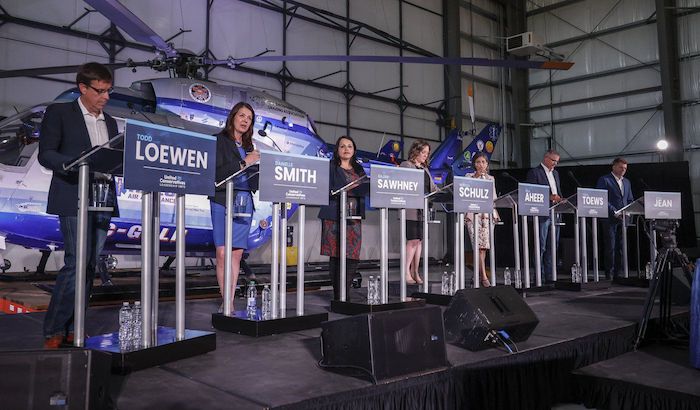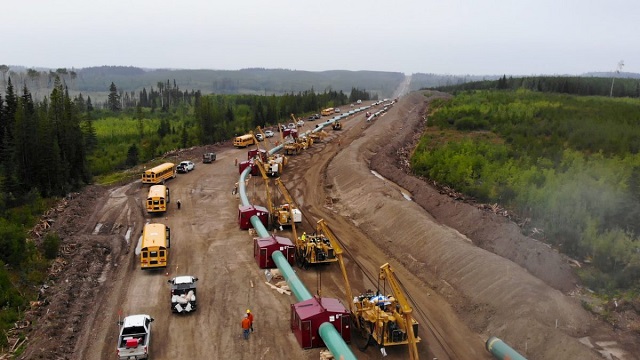Alberta
Project Confederation group urging UCP Leadership hopefuls to consider Alberta first

Article submitted by Josh Andrus of Project Confederation
The current Alberta government has certainly talked the talk about standing up to the federal government much better than previous administrations.
Actions speak louder than words, though, and action has been sorely lacking.
It has been more than nine months since Albertans strongly voiced their opinion in favour of abolishing equalization from the Constitution.
In the aftermath, the muted response from the federal government speaks volumes – when we called, nobody answered.
It has, therefore, become glaringly obvious that the equalization referendum was not enough to convince Ottawa to come to the table and initiate constitutional talks.
It’s also important to make sure we keep focused not just on any one particular problem, but on the core issue itself – the jurisdictional fight between the federal government and the provinces.
That’s why we need to effectively communicate to every Albertan three things:
- How the Canadian federation is supposed to work
- How it’s actually being run at the moment
- How to fix the problem and get it back to how it should be
1 How Canada is supposed to work is misunderstood (or misrepresented, perhaps deliberately so) all the time by the media, academics, politicians, and many others.
Canada is designed as a federation, and that word actually means something.
A federation is a union of (at least partially) self-governing states or provinces.
The creation of Canada didn’t merge a bunch of provinces, territories, colonies and countries into a single new entity.
Canadian confederation created a system where there was a clear division of powers between the federal government and the provinces.
Many (especially in Ottawa) think that the federal government sits “above” the provinces, suggesting it is more important, more powerful, and can tell the “lower” level of government what to do.
In fact, the federal government has complete sovereignty over the issues they were given jurisdiction over, while the provincial governments have complete sovereignty over the issues they were given jurisdiction over.
In short, Alberta – and all the other provinces – are supposed to be equal partners in this country, not subservient to continuously hostile federal governments in Ottawa.
2 Unfortunately, over time, the federal government has exerted jurisdiction over things it’s not supposed to control, and because the federal government gets to appoint federal judges, the federal judges have tended, also over time, to let the federal government get away with this.
Historically, this has involved ever-increasing federal control of natural resources and environmental concerns and the current federal government continued this trend, spending the past seven years trampling all over the constitutional jurisdiction of Alberta – through Bill C-69, Bill C-48, the carbon tax, and more.
Worse, they haven’t just completely ignored Alberta’s complaints about this overreach – they’ve actually continued to make things worse.
Since the equalization referendum, the federal government has continued to roll out even more new federal policies that will take over Alberta’s jurisdiction on a wide range of issues – childcare funding, healthcare rules, agriculture and fertilizer constraints, environment regulations, and more.
The current relationship between federal and provincial governments in Canada is not how it is supposed to be, and it isn’t sustainable.
Something has to give.
3 Given this approach by the federal government, it has become abundantly obvious that the equalization referendum was not enough to convince Ottawa to come to the table and negotiate some kind of compromise with Alberta.
Alberta must stand up for itself.
Alberta needs to start saying no to Ottawa, not just asking Ottawa nicely to change their mind.
Alberta must also demand that the Canadian Constitution be re-opened.
If the federal government’s judges are willing to twist the words in the Constitution so much that they become meaningless, then we need to re-write sections of the Constitution to make it crystal clear, in plain language, that the federal government’s current actions will not be tolerated or permitted any longer.
At a minimum, these changes would involve:
- Abolishing equalization
- A fair House of Commons
- An equal Senate
- Unrestricted free trade (including pipelines)
- Complete provincial control over resources
Yes, this would be a big change from the current status quo.
But, let’s be clear, that’s only because things have drifted so far from what they are supposed to be.
Albertans are not actually asking for anything unique or radical.
We are simply asking for the federal government to follow the rules of the Constitution as they are written, not as they’ve been twisted to mean since.
And if the federal government won’t even agree to something as simple as that, well… at least we’ll have our answer then
Regards,
Josh Andrus
Executive Director
Project Confederation
PS: If you’re in a position to contribute financially to our important work fighting for Alberta, you can make a donation here.
Alberta
Alberta bill would protect freedom of expression for doctors, nurses, other professionals

From LifeSiteNews
‘Peterson’s law,’ named for Canadian psychologist Jordan Peterson, was introduced by Alberta Premier Danielle Smith.
Alberta’s Conservative government introduced a new law that will set “clear expectations” for professional regulatory bodies to respect freedom of speech on social media and online for doctors, nurses, engineers, and other professionals.
The new law, named “Peterson’s law” after Canadian psychologist Jordan Peterson, who was canceled by his regulatory body, was introduced Thursday by Alberta Premier Danielle Smith.
“Professionals should never fear losing their license or career because of a social media post, an interview, or a personal opinion expressed on their own time,” Smith said in a press release sent to media and LifeSiteNews.
“Alberta’s government is restoring fairness and neutrality so regulators focus on competence and ethics, not policing beliefs. Every Albertan has the right to speak freely without ideological enforcement or intimidation, and this legislation makes that protection real.”
The law, known as Bill 13, the Regulated Professions Neutrality Act, will “set clear expectations for professional regulatory bodies to ensure professionals’ right to free expression is protected.”
According to the government, the new law will “Limit professional regulatory bodies from disciplining professionals for expressive off-duty conduct, except in specific circumstances such as threats of physical violence or a criminal conviction.”
It will also restrict mandatory training “unrelated to competence or ethics, such as diversity, equity, and inclusion training.”
Bill 13, once it becomes law, which is all but guaranteed as Smith’s United Conservative Party (UCP) holds a majority, will also “create principles of neutrality that prohibit professional regulatory bodies from assigning value, blame or different treatment to individuals based on personally held views or political beliefs.”
As reported by LifeSiteNews, Peterson has been embattled with the College of Psychologists of Ontario (CPO) after it mandated he undergo social media “training” to keep his license following posts he made on X, formerly Twitter, criticizing Trudeau and LGBT activists.
He recently noted how the CPO offered him a deal to “be bought,” in which the legal fees owed to them after losing his court challenge could be waived but only if he agreed to quit his job as a psychologist.
Early this year, LifeSiteNews reported that the CPO had selected Peterson’s “re-education coach” for having publicly opposed the LGBT agenda.
The Alberta government directly referenced Peterson’s (who is from Alberta originally) plight with the CPO, noting “the disciplinary proceedings against Dr. Jordan Peterson by the College of Psychologists of Ontario, demonstrate how regulatory bodies can extend their reach into personal expression rather than professional competence.”
“Similar cases involving nurses, engineers and other professionals revealed a growing pattern: individuals facing investigations, penalties or compulsory ideological training for off-duty expressive conduct. These incidents became a catalyst, confirming the need for clear legislative boundaries that protect free expression while preserving professional standards.”
Alberta Minister of Justice and Attorney General Mickey Amery said regarding Bill 13 that the new law makes that protection of professionals “real and holds professional regulatory bodies to a clear standard.”
Last year, Peterson formally announced his departure from Canada in favor of moving to the United States, saying his birth nation has become a “totalitarian hell hole.”
Alberta
‘Weird and wonderful’ wells are boosting oil production in Alberta and Saskatchewan

From the Canadian Energy Centre
Multilateral designs lift more energy with a smaller environmental footprint
A “weird and wonderful” drilling innovation in Alberta is helping producers tap more oil and gas at lower cost and with less environmental impact.
With names like fishbone, fan, comb-over and stingray, “multilateral” wells turn a single wellbore from the surface into multiple horizontal legs underground.
“They do look spectacular, and they are making quite a bit of money for small companies, so there’s a lot of interest from investors,” said Calin Dragoie, vice-president of geoscience with Calgary-based Chinook Consulting Services.
Dragoie, who has extensively studied the use of multilateral wells, said the technology takes horizontal drilling — which itself revolutionized oil and gas production — to the next level.
“It’s something that was not invented in Canada, but was perfected here. And it’s something that I think in the next few years will be exported as a technology to other parts of the world,” he said.
Dragoie’s research found that in 2015 less than 10 per cent of metres drilled in Western Canada came from multilateral wells. By last year, that share had climbed to nearly 60 per cent.
Royalty incentives in Alberta have accelerated the trend, and Saskatchewan has introduced similar policy.
Multilaterals first emerged alongside horizontal drilling in the late 1990s and early 2000s, Dragoie said. But today’s multilaterals are longer, more complex and more productive.
The main play is in Alberta’s Marten Hills region, where producers are using multilaterals to produce shallow heavy oil.
Today’s average multilateral has about 7.5 horizontal legs from a single surface location, up from four or six just a few years ago, Dragoie said.
One record-setting well in Alberta drilled by Tamarack Valley Energy in 2023 features 11 legs stretching two miles each, for a total subsurface reach of 33 kilometres — the longest well in Canada.
By accessing large volumes of oil and gas from a single surface pad, multilaterals reduce land impact by a factor of five to ten compared to conventional wells, he said.
The designs save money by skipping casing strings and cement in each leg, and production is amplified as a result of increased reservoir contact.
Here are examples of multilateral well design. Images courtesy Chinook Consulting Services.
Parallel
Fishbone
Fan
Waffle
Stingray
Frankenwells
-

 Health17 hours ago
Health17 hours agoTens of thousands are dying on waiting lists following decades of media reluctance to debate healthcare
-

 Business2 days ago
Business2 days agoI Was Hired To Root Out Bias At NIH. The Nation’s Health Research Agency Is Still Sick
-

 Carbon Tax21 hours ago
Carbon Tax21 hours agoCarney fails to undo Trudeau’s devastating energy policies
-

 Business18 hours ago
Business18 hours agoBudget 2025: Ottawa Fakes a Pivot and Still Spends Like Trudeau
-

 Opinion12 hours ago
Opinion12 hours agoLandmark 2025 Study Says Near-Death Experiences Can’t Be Explained Away
-

 International1 day ago
International1 day agoCanada’s lost decade in foreign policy
-

 armed forces1 day ago
armed forces1 day agoCanada At Risk Of Losing Control Of Its Northern Territories
-

 Business2 days ago
Business2 days agoLarge-scale energy investments remain a pipe dream











